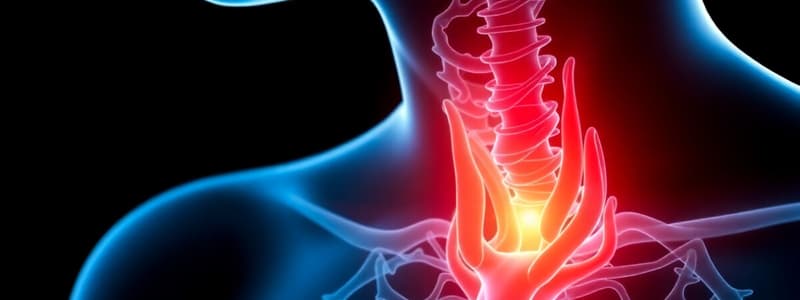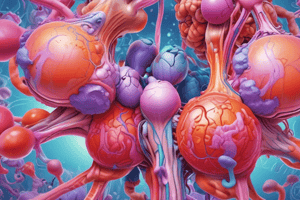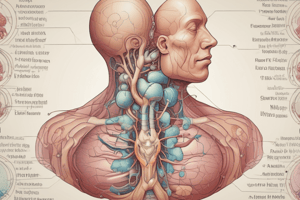Podcast
Questions and Answers
Which hormone is secreted by the follicular cells of the thyroid gland?
Which hormone is secreted by the follicular cells of the thyroid gland?
What is the primary effect of thyroid hormones on metabolic processes?
What is the primary effect of thyroid hormones on metabolic processes?
Which statement is true regarding the structure of T3 and T4 hormones?
Which statement is true regarding the structure of T3 and T4 hormones?
What effect do thyroid hormones have on the cardiovascular system?
What effect do thyroid hormones have on the cardiovascular system?
Signup and view all the answers
How do high levels of thyroid hormones affect protein synthesis?
How do high levels of thyroid hormones affect protein synthesis?
Signup and view all the answers
What is the calorigenic action of thyroid hormones primarily related to?
What is the calorigenic action of thyroid hormones primarily related to?
Signup and view all the answers
Which body system experiences increased motility due to thyroid hormones?
Which body system experiences increased motility due to thyroid hormones?
Signup and view all the answers
Which of the following is NOT a function of thyroid hormones?
Which of the following is NOT a function of thyroid hormones?
Signup and view all the answers
Study Notes
Endocrine System Overview
- The endocrine system is a complex network of glands and hormones that regulate various physiological processes.
- The endocrine system comprises organs responsible for hormone production and release.
Thyroid Gland
- The thyroid gland is a crucial component of the endocrine system.
- It secretes thyroid hormones, vital for numerous bodily functions.
- Thyroid hormones are categorized into thyroxine (T4), triiodothyronine (T3), and calcitonin (Ca lowering).
- T4 and T3 are produced by follicular cells, while calcitonin is synthesized by parafollicular cells.
Thyroid Hormones
- Thyroid hormones (T3 and T4) contain iodine.
- T4 is a prohormone, primarily responsible for transport.
- T3 is more potent, having a shorter half-life and quicker action.
- T3 and T4 are crucial for metabolic processes.
Transport and Regulation of Release
- Most of released T3 and T4 immediately bind to plasma proteins, notably thyroxine-binding globulin (TBG).
- More than 99% of thyroid hormones are bound, and less than 1% is free.
- The free thyroid hormones are physiologically active and regulate pituitary TSH release.
Advantage of Binding
- Thyroid hormone binding serves as a reservoir.
- It prolongs the action of free hormones.
Functions of Thyroid Hormones
- The thyroid hormones play a vital role in numerous bodily functions.
- They are crucial for metabolism, growth, and multiple body systems
1- Metabolic Functions: Calorigenic Action
- Thyroid hormones increase the size and number of mitochondria within cells.
- This leads to an enhanced rate of ATP formation.
- A key effect of thyroid hormones is an increase in basal metabolic rate and energy consumption.
1-Metabolic Functions: Processes of Metabolisms
- Thyroid hormones impact carbohydrates, lipids, and protein metabolism.
- Enhancing carbohydrate utilization and glycogenolysis and gluconeogenesis.
- Promoting lipolysis, which leads to fat reduction and weight decrease.
- In healthy individuals, they promote protein synthesis, while excesses can cause catabolism.
II- Effects on Growth
- Thyroid hormones are essential for physical, mental, and sexual growth.
- Thyroid hormones maintain normal growth and skeleton maturation by stimulating protein synthesis.
- Hormones also stimulate secretion and intensify the impact of growth hormone.
III- Effects on Body Systems
- Thyroid hormones influence cardiovascular by increasing heart rate and contractility.
- Thyroid hormones affect respiratory function by increasing respiration rate and depth.
- Impacts gastrointestinal activity through increased appetite, food intake, secretions, and motility.
- Stimulate red blood cell synthesis in bone marrow.
I- Thyroid Stimulating Hormone (TSH)
- TSH (thyrotropin) is secreted by thyrotropes in the anterior pituitary.
- TSH release is regulated by TRH (thyrotropin-releasing hormone) from the hypothalamus.
Negative Feedback Mechanism
- Negative feedback loops govern the secretion of thyroid hormones.
- Free thyroid hormones exert negative feedback on the hypothalamus and anterior pituitary, regulating TSH release.
II- Dietary Iodine Intake
- Adequate iodine intake (150 micrograms/day) is crucial for normal thyroid function.
- Iodine deficiency can cause goiter.
- Iodine is abundant in coastal regions and sea food and can be sourced from other foods.
Abnormal Thyroid Function
- Abnormalities in thyroid hormone secretion can lead to conditions like hyperthyroidism (excess) and hypothyroidism (deficient).
- Hyperthyroidism (e.g., Graves' disease) is characterized by excessive thyroid hormone secretion.
- Conditions such as hypothyroidism (e.g., myxedema) is marked by subnormal hormonal output.
- Causes of cretinism, a condition impacting infants, include maternal iodine deficiency, thyroid agenesis, and congenital defects in enzymes.
I- Hyperthyroidism
- Hyperthyroidism is characterized by excess thyroid hormone secretion.
- Grave's disease, thyroiditis, and other hypersecreting adenomas are common causes.
II- Hypothyroidism
- Marked by deficiency in thyroid hormone secretion.
- Autoimmune diseases (e.g., Hashimoto's thyroiditis), irradiation, surgical removal, and iodine deficiency are some causes.
Myxedema
- Myxedema is a severe form of hypothyroidism.
- Characterized by basal metabolic rate reduction.
- Increased body weight and cold intolerance are common symptoms.
- Other symptoms include increased skin puffiness, constipation, and anemia.
Cretinism
- Cretinism is a condition primarily affecting infants associated with thyroid hormone deficiency, often resulting from maternal iodine deficiency during pregnancy.
- Commonly characterized by dwarfism, developmental delays, mental retardation, and physical abnormalities.
- Includes thyroid agenesis, congenital defects in synthesis enzymes, maternal/infant iodine deficiency, or hypothalamic/pituitary dysfunction.
Diagnotic Tests for Hyperthyrodisim
- Diagnosing hyperthyrodisim involves measuring free T3, T4, TSH, TSI (thyroid stimulating immunoglobulins), and a BMR increase.
- A decrease in cholesterol levels might also be indicated.
Treatment
- Treatment options include surgical removal of the thyroid (thyroidectomy).
- Radioactive iodine ingestion to selectively target and destroy overactive thyroid cells.
- Anti-thyroid drugs are used to manage thyroid hormone secretion.
Studying That Suits You
Use AI to generate personalized quizzes and flashcards to suit your learning preferences.
Related Documents
Description
This quiz explores the essential components of the endocrine system, focusing on the thyroid gland and its hormones. Learn about the functions, production, and regulation of thyroid hormones that play a vital role in metabolism and overall physiology.




